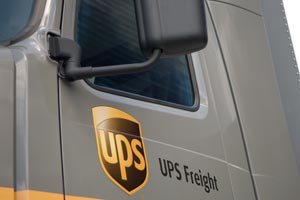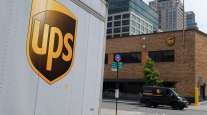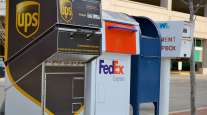UPS First-Quarter Results Improve, But Company Might Face $3.5 Billion Pension Charge

Parcel and logistics company UPS Inc. posted first-quarter increases in revenue and net income despite the mixed economic situation — nationally and internationally — and also acknowledged it might have to take a charge against earnings of about $3.5 billion related to a pension issue.
Atlanta-based UPS earned $1.13 billion, or $1.27 a share, on global, first-quarter revenue of $14.42 billion. During the same time in 2015, the No. 1 carrier on the Transport Topics Top 100 list of U.S. and Canadian for-hire carriers had net income of $1.03 billion, or $1.12, on revenue of $13.98 billion.
Operating profits increased for domestic and international package shipping but declined for the supply chain-freight division, as less-than-truckload revenue at UPS Freight decreased year-over-year.
Chairman and CEO David Abney described the results during an April 28 earnings call as “another excellent quarter,” featuring double-digit profit growth from the international package segment. Domestically, the company enjoyed benefits from strong consumer spending that yielded business-to-consumer, B2C, packages, but declines in industrial production have cut into manufacturing-related shipments, he said.
The company said its basic freight rates increased by about 2%, year-over-year, but the fall in fuel prices for trucks and cargo jets caused fuel surcharge revenue to decline.
The pension issue relates to the Central States Fund for Teamsters, from which UPS withdrew in 2007, paying $6 billion at the time to do so.
Central States has petitioned the Department of the Treasury in the fall to cut benefits it pays because the fund does not have enough investment income to keep paying 100% of its obligations. UPS General Counsel Norman Brothers Jr. said during the call that UPS would make supplementary payments to retired company employees if the cuts are ordered legally.
RELATED: Four Ohio Trucking Companies Must Pay $3.4 Million to Central States Pension Fund
Brothers said UPS expects Treasury to make a decision on Central States around May 7. Even if Treasury decides for the pension fund and allows the cuts, Brothers said UPS would oppose the decision because “it does not conform with the law.”
UPS Chief Financial Officer Richard Peretz said if the payments are made, they would be an ongoing liability for UPS and the company would deal with it by taking a charge against earnings of $3.2 billion to $3.8 billion later this year. He said that would not cause UPS to decrease its 2016 earnings forecast of $5.70 to $5.90 a share, but it could drive it into the lower part of the range.




